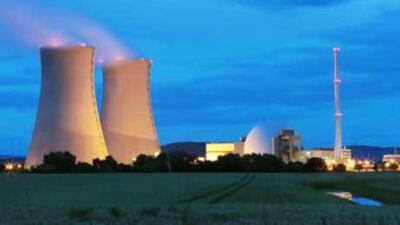The environmental movement in Europe is in shock after one of its brightest young activists announced his support for nuclear power. The move by Mark Lynas, 35, is the second blow in a few months to the resolutely anti-nuclear movement. George Monbiot, another high-profile environmentalist from Britain, announced in August that, after much agonising, he had decided that nuclear power was the only credible way to tackle global warming.
There was no other way, said Mr Monbiot, 45, who has held visiting fellowships at Oxford, Bristol and Keele universities, to reduce carbon emissions in an energy-hungry world. A spokesman for the Green Party in the UK described the defections as "a big blow to us and a fillip to the nuclear industry". "George and Mark are very respected and influential. They are so worried about climate change that they have pushed the panic button. But nuclear power isn't the answer. Nuclear power is dangerous and pollutes. We must go for renewable forms of energy and we must reduce energy consumption."
The conversions of the two men, once implacably opposed to nuclear power, challenges one of the central tenets of the green movement: that nuclear power is bad. "It has been an article of faith for many, many years," said Mr Lynas, who has written several books and articles on climate change. "If you were a Green you opposed nuclear power. Simple. It was as hard for me to say this as it was for a person to come out and say they were gay in the Eighties. But I had no choice."
Both Mr Lynas and Mr Monbiot argue that their rather dramatic about-face illustrates just how important it is to stop global warming, primarily caused by the release of carbon during the burning of fossil fuels. Nuclear power, properly controlled, and produced in the new generation of fast-breeder reactors, which were immeasurably safer and more efficient than the reactors of the late 20th century, is the only alternative to coal and gas-powered stations, Mr Lynas said.
According to the Intergovernmental Panel on Climate Change, nuclear emits no more carbon than wind or solar energy. Renewable energy sources will of course remain important, Mr Lynas said, but only as a secondary source as they cannot supply anything like enough electricity. As the world becomes greener, by replacing petrol and diesel-driven vehicles with battery-powered ones, so will the demand for electricity rise.
If the world built 6,000 or so such stations, he said, and scrapped the fossil-powered plants, it would be a major victory against global warming. The conversions of Mr Monbiot and now Mr Lynas are the latest in a series of public relations triumphs for an industry that once seemed doomed, following headline grabbing reactor accidents such as Chernobyl and fears about cancer risks from leaking radiation.
This summer, an opinion poll showed that Europeans were equally divided about the merits of nuclear power, in contrast to polls a few years earlier, which revealed a substantial majority against the industry. While some European countries, such as Sweden, Germany and Belgium, are phasing out nuclear power stations, others, such as Finland, are building them. In the UK, where nuclear power had been dismissed as an aberration, the debate now is more about how to store waste from new nuclear power stations rather than the wisdom of building them.
In the United States, the president-elect Barack Obama has said that he wants to use "clean" technology, including nuclear power, to stop global warming and reduce the country's dependence on Middle East oil. In the developing world, governments such as Venezuela, are turning to established nuclear nations, such as Russia, for help in building nuclear reactors. The behaviour of Iran, which insists that it will enrich its own uranium rather than buy it from overseas, has reinforced the dangers of nuclear proliferation since this could give Iran a nuclear weapon capability.
But other countries, such as the UAE, which want to build nuclear power stations have made it clear they will stick to the international guidelines to ensure that there can be no crossover between civil and military nuclear programmes. Mr Lynas is unrepentant about his new enthusiasm for nuclear energy. "I was nervous. I make my living by writing, broadcasting and giving lectures about the environment. I don't want to alienate my constituency. But I had no choice. I know that others feel the same as me. I have had e-mails from people in the movement I respect who say, 'Look, we agree but we can't say so publicly.'"
Fifty years ago, when the nuclear industry was in its infancy and power stations were so unpredictable, it was a completely different situation, he said. The new, fourth generation nuclear reactors were more efficient and much safer. Opposition today was emotional and based on complex prejudices, not the evidence. "You must remember that the civil nuclear industry used to be seen as the same as the nuclear weapons industry. If you opposed nuclear weapons you opposed nuclear power. Nuclear power requires centralised control, which many in the movement do not like. The Green lobby doesn't like the idea that the world can be saved by building nuclear power stations. It wants us to chop wood, go back to nature."
But he warned the nuclear industry - traditionally secretive and, so its critics allege, ruthless and deceitful - that his conversion did not mean he would relax his guard. "I am more committed than ever to the environment." The push would now be on countries with the financial and geographical resources, like the UAE, to boost energy output in an environmentally-friendly manner. "Imagine, a country like the UAE could build nuclear power stations and transport the energy. It has the money to do that. It could build massive solar-collectors and ship that energy abroad too."
sfreeman@thenational.ae

